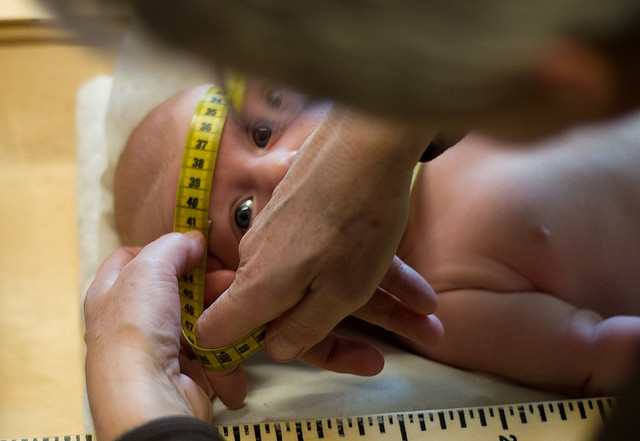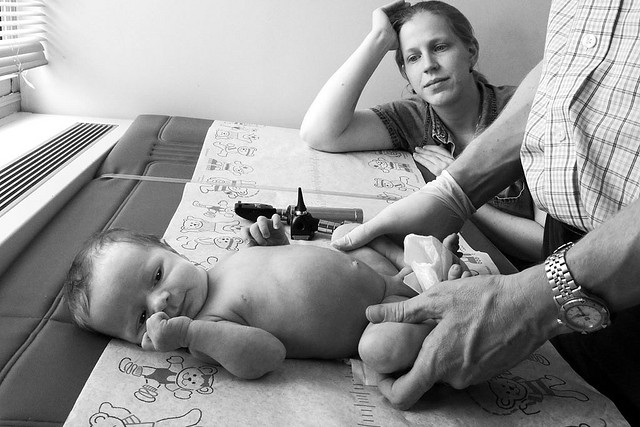 As a new mother of an infant, you may be feeling overwhelmed with taking care of such a young helpless human being that requires you to assist them with their every need. One of your primary concerns will be to make sure you are doing everything possible to ensure that your baby remains a healthy bundle of joy! Here are some key points to keep in mind when it comes to your baby’s health.
As a new mother of an infant, you may be feeling overwhelmed with taking care of such a young helpless human being that requires you to assist them with their every need. One of your primary concerns will be to make sure you are doing everything possible to ensure that your baby remains a healthy bundle of joy! Here are some key points to keep in mind when it comes to your baby’s health.
Post Natal Care
Your baby is new to the world and has not been exposed to the variety of germs and bacteria as you have. Since they have such fragile immune systems, here are some things to do and keep in mind:
- Limit interaction with large groups of people prior to your baby’s first set of immunization shots.
- Keep people with contagious diseases away from your baby. This can be very difficult for immediate family members, just use precaution within reason.
- Wash your hands regularly, especially after diaper changes.
- Avoid using skin and hair products that are meant for older children and adults. Your baby’s skin is very sensitive to fragrances and strong cleansing chemicals.
Selecting Pediatrician
It is perfectly understandable if as a new parent you have not yet thought about having an ongoing pediatrician for your child, however this is one of the most important decisions you will make for your child. It may be a good idea to check if the medical facility you chose for pregnancy care also has reliable pediatricians, as today it is less difficult to find a modern medical facility that covers everything from antenatal to pediatric care.
Most medical centers will require an initial well child visit within 48-72 hours of your baby’s exit from the hospital. This will give you an opportunity to feel out the facility, doctor, and staff. You can use Australian Health Practitioner Regulation Agency (AHPRA)register of practitioners to research the pediatrician’s credentials. In the US, many parents choose a pediatrician based on recommendations from their insurance company and friends.
Some things to be on the look-out for during that well child initial visit include:
- How clean was the facility?
- Was the level of professionalism from the staff and pediatrician towards your child and you appropriate?
- Were all of your concerns addressed in a manner you could understand?
- Do they take your insurance?
- Were you provided information about upcoming immunizations, child development milestones, and what to do when you have concerns about your child’s health?
- Does the staff and doctors support your breastfeeding goals?

What can I expect during my child’s future well child visits?
You will complete an intake form describing your child’s current level of development. The intake form usually will ask:
- Eating habits with regards to nursing, formula, and solids when appropriate
- Urination and bowel movement frequency
- Oral language such as babbling and cooing
- Hearing and responding to sudden noises or the parent’s voice
- Gross motor development (tummy time, lifting/turning of head, rolling over, sitting up, crawling, attempting to use furniture to pull oneself up, etc.)
- Fine motor development (grasping objects with hands, transferring object from one hand to the other, picking up objects to bring to mouth, picking objects then dropping them, etc.)
- Lead risk exposure
- If your child has had an emergency visit between the last well child appointment
What is discussed during the well child visits?
- The intake form you completed
- Baby’s weight, height, and head circumference measurement norm percentages
- Next step suggestions for the child’s upcoming developmental milestones
- Immunizations the child will be receiving that day of the visit
- Any questions you may have
When you are unsure if your baby is actually ill, it can be very disconcerting as a new parent. You should call your child’s pediatrician when they are experiencing:
- Temperature of at least 100.4
- More irritable than usual or inconsolable for an extended period of time
- Rashes on their skin
- Sleepy or fatigue more than usual
- Runny stools or vomiting
- Difficulty breathing (Dial 911)
When you have concerns about your baby’s health, call your pediatrician for health advice. Also, invest in books and resources that address child development such as Dr. Benjamin Spok’s book entitled, “Dr. Spok’s: The First Two Years.”
Finally, becoming a parent is one of the most life changing events. It may seem difficult, for some moms even impossible at times, but you shouldn’t forget to enjoy your time with your baby and cherish each moment you have together.
Photo Credit:
Top photo: Flickr via Creative Commons
Comments
2 responses to “Tips for First Time Moms: Taking Care of Your Child’s Health”
I don’t have children but I thought a lot about these issues when my cat got sick. I am grateful that I have become an accomplished holistic healer and mostly weaned myself and my pets off of Western medicine. It failed me way too many times.
Hi Christy,
That surely was an informative post 🙂
Yes indeed, Benjamin Spock is the one and only book that I read and loved it too for the wonderful lessons it gave all of us on how to raise kids and everything about the health care of your child. Nothing could be better.
Thanks for sharing. Have a nice week ahead 🙂